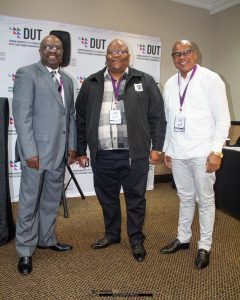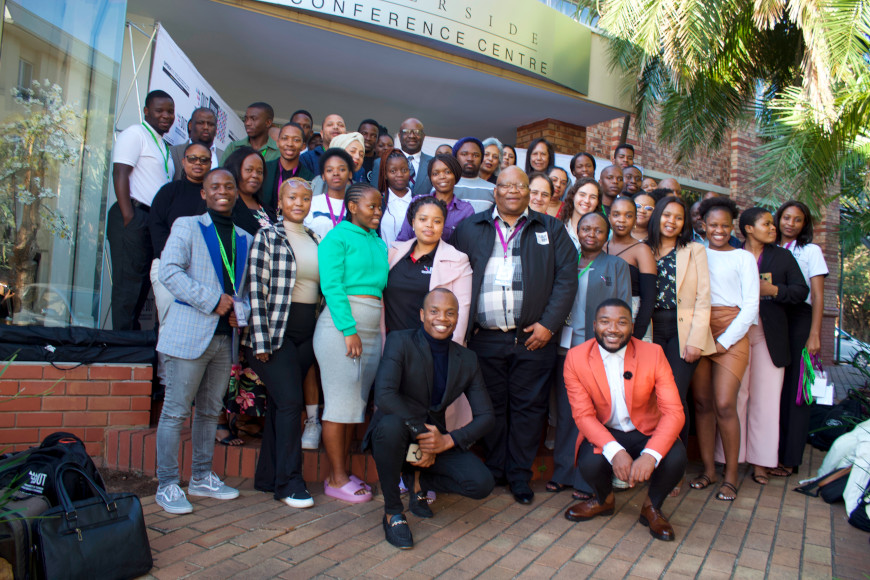A Durban University of Technology (DUT) Student Services Summit 2023 took place at the Riverside Conference Centre on Thursday, 7 September 2023. The theme of the event was “Adaptive Graduates why are we legitimizing?”
The programme was convened and moderated by Dr Clement Moreku (Dean of Students) and Dr Mzwandile Khumalo (Siyaphumela Institutional lead and Teaching, Learning and Development Practitioner) respectively.
In attendance at the summit were the Institutional Registrar, Dr Maditsane Nkonoane, Dean of Students from Unizulu, Dr T Ncokazi, Assistant Registrar: Academic Data and Student Records, Ms Bongiwe Mnyandu. DUT student services managers, Mr Masiza Ngculu, Student Governance and Development Manager, Mr Bongani Yengwa, Manager: Sports Administration, Student Housing and Residence Life Manager (Durban): Mr Reginald P Mnyango, Student Housing and Residence Life Manager (Midlands): Mrs Celiwe F Chemane-Nyathi, Student Counselling and Health Director: Dr Naseem Haniff, Student Counselling and Health Acting Director (Midlands): Mr Sihle Mbanjwa, Fathima Haffejee, Director of Student Services and Development at the DUT Midlands Centre, distinguished guests from academia, and student leaders.
The event began with the opening remarks delivered by Dr Clement Moreku, who welcomed all the guests to this very important DUT Student Services Summit 2023, an integral of the Sikusekele (We’ve got you), first focus area of the Siyaphumelela.
“ We have intentionally curated and titled this summit ‘Adaptive graduates: What are we legitimizing.’ To afford colleagues an opportunity to reflect on the impact of the array of student support and development initiatives, that are core to the existence of the Student Services sector,” he stressed.
He indicated that the summit further converges ideas to reflect on the impact of DUT’s daily practices towards holistic student success, as a community of practice. “We create a space to reimagine and co-create student services as a matrix for holistic student success. The ENVISION2030 statement of intent succinctly outlines the point of arrival, ‘our people will be creative, innovative, entrepreneurial and adaptive to changes in the world; our people will participate productively in the development of our region, country and the world’. From this, we already see a direction towards what success may mean for the university,” replied Dr Moreku.
He further added that even more explicitly, the 12th strategic objective ‘Adaptive Graduates: develop graduates with the acumen to initiate and/or respond to change’ foregrounds the approaches and practices for student support, development, and success at DUT. Delivering his keynote address was the Institutional Registrar, Dr Maditsane Nkonoane. Prior to his current role, he was the Dean of Students. Dr Nkonoane outlined his presentation: Professionalizing Student Affairs, which included the introduction, statement of the problem, literature review, student affairs practice in South Africa, and the most essential part of the presentation which is on the external competencies for student affairs practices.
“If we are to be student affairs practitioners without salt what defines us, what must be known? What distinguishes us from a lecturer in the classroom, what distinguishes us from a cleaner, these are instances you may also be shocked to find that cleaners are even more professional than student affairs practitioners. Sometimes student affairs practitioners allow their environments to be toxic, nanocolumn infections. We need to address as robustly as we can so that we can be the best that we can ever be,” he said.
He commented that the statement of the problem is that student affairs profession continues to be viewed as an immature profession due to lack of professional development opportunities. Dr Nkonoane’s literature review found that there is neither a single way to prepare professionals, nor a definitive set of professional standards.
“The research also questions the adequacy of graduate programmes in the rapidly changing environment of higher education in the USA. No set qualifications for staff-upper level managers may have advanced degrees but entry level practitioners seldom have degrees related to the practice,” he said.

Pictured: Dr Clement Moreku (Dean of Students), Institutional Registrar, Dr Maditsane Nkonoane, and Dean of Students from Unizulu, Dr T Ncokazi.
His recommendations stemming from his research for future research is that research should be conducted by gathering input from the leadership of student affairs organisations such as the South African Association of Senior Student Affairs Professionals (SAASSAP) and National Association of Student Development Practitioners (NASDEV). He also mentioned that in accordance to the 2010 National Survey of South African Student Affairs Practitioners which was commissioned by SAASSAP confirmed the need for formal preparation programmes for student affairs practitioners.
Speaking further was Dr Khumalo who gave his presentation on: Knowing, Doing and Transforming Supporting Student Success at DUT. He spoke on the current status quo of student services/affairs in South Africa. “We must understand the nature of the work and professionalise it, so that it is not just ad-hoc, but impact driven. Efforts have been made to advance the scholarship of the sector, but there is more that still needs to be done, such as developing relevant and contextualized practices,” he said.
He relayed that student services are not a stand-alone project but an integral of the academic agenda. He further spoke on international collaborators, integrating institutional activities and projects that support staff and students such as the Hotel School veggie garden and DUT’s Deaf Centre which launched the South African Sign Language translations of selected emergency communications and information of high importance; an initiative which addresses the language needs of deaf students and staff.
Dr Khumalo also presented the draft of the Student Support, development and success framework that has been developed through the design thinking workshops with students. He further alluded that this would foreground the work that is done within all student support and development stakeholders within DUT.
The summit ensued with panel discussions with Sanele Khumalo, DUT SRC president, Jessica Alberts, a 6th year master’s chiropractic student , and Joy Gcabashe, SRC Secretary General. The topic of discussion was on cultivating inclusion for success, and embracing student agency. The essence of the topic zoomed on the fact that support and other engagements within the university tend to be for the black majority and may not cater much, for the minority groups.
The session created a platform for students to share views on how they can foster an inclusive and diverse DUT for student success. Moreover, it responded to the question; how can they can use student activism as a vehicle for a transformative higher education. Further on, Dr Moreku focused his presentation on: Re-Imagining Student Services through the ENVISION2030 lens. Other presentations from the various units within student services and academic development, responded to the three (3) questions, what data are we collecting; how does it inform our practices; what impact are we making towards student success.
The day culminated to an end with Dr Nkonoane delivering the vote of thanks. Day 2 of the summit will continue with further presentations to be showcased at the ML Sultan Conference, on Friday, 15 September 2023.
Pictured: Attendees at the summit.
Waheeda Peters

